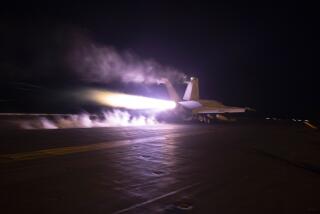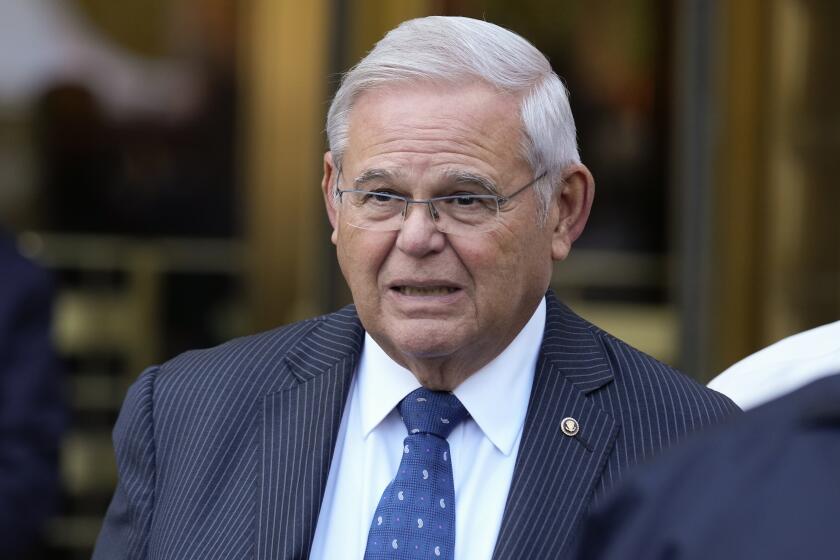Yemen’s exiled prime minister returns to Aden to reestablish government
Yemen’s exiled prime minister returned to the war-torn country Wednesday with several members of Cabinet, seeking to re-establish the government in the southern port city of Aden after nearly six months in Saudi Arabia.
The return of Prime Minister Khaled Bahah, who also serves as vice president, came after pro-government forces drove Shiite Muslim rebels and their allies from Aden in July and started pushing north toward the capital, Sana.
President Abdu Rabu Mansour Hadi had designated Aden his temporary capital before fleeing to Riyadh in March as the rebels closed in on his refuge. His continued absence raises questions about the extent of his government’s hold on the city, which has seen some of the worst fighting of the war.
Residents complain about the presence of armed men in the streets, some of them believed to be affiliated with Al Qaeda or Islamic State. On Wednesday, assailants set fire to a church in the latest of a string of attacks that have included assassinations of high ranking military officers and other prominent figures.
“Almost every day there is an incident of killing, shooting or clashes,” said Abdul-Fattah Haiderah, a political analyst from southern Yemen now based in Sana. “Crime has increased, security is deteriorating and basic services are not back.”
Hadi’s absence could also be an indication of moves afoot to replace him, said Ghamdan Yousfi, another Yemeni political analyst now based in Cairo.
Many government supporters accuse Hadi of not doing enough to resist the insurgents known as Houthis when they seized the capital last September. Some also blame him for the deadly airstrikes launched by a Saudi-led coalition of Sunni Persian Gulf states against the Houthis, who they view as proxies of Shiite-led Iran.
Bahah made a brief visit to Aden in August. But this time, his return and that of his ministers will be permanent, government spokesman Rajeh Badi told reporters in the city.
Bahah was accompanied by the ministers of interior, telecommunications, planning and international cooperation, social affairs and labor, as well as other officials. They joined several other ministers, who have returned since July, and planned to hold their first formal Cabinet meeting on Thursday.
Their return, Badi said, “sends a message to both the inside and outside [world] that all the Yemeni files will be in the hands of a legitimate government on Yemeni lands.”
He said the level of destruction in Aden and other southern regions was huge and that government capabilities had collapsed, so officials would need help from their Gulf allies and other countries to address the humanitarian needs.
Bombardments and ground clashes have killed more than 4,800 people, about half of them thought to be civilians, according to United Nations estimates. The destruction of infrastructure, along with a naval blockade imposed by the coalition on Yemen’s main ports, has caused critical shortages of fuel and medical supplies and left millions without access to electricity or clean water.
With many of the country’s health facilities closed, outbreaks of dengue fever, malaria. and other treatable diseases have become deadly.
Two senior U.N. officials warned this week that violence could escalate in central Yemen, if Sana becomes the scene of confrontations between pro-Houthi forces and advancing coalition troops, and civilians would bear the brunt of the bloodshed.
“Unless there is a serious commitment of the parties to find a political solution to the conflict that will end the violence and ensure humanitarian access to all populations, without discrimination, the situation is likely to degenerate further,” said the U.N. special advisor on the prevention of genocide, Adama Dieng, and his counterpart on the responsibility to protect, Jennifer Welsh, in a statement Tuesday.
Hadi’s government pulled out of U.N.-brokered peace talks over the weekend.
Badi said the government is willing to meet with the Houthis and their allies among forces still loyal to Yemen’s deposed strongman, Ali Abdullah Saleh, but only if they accept a United Nations resolution calling on them to recognize Hadi as president and withdraw from Yemen’s main cities.
Special correspondent Al-Alayaa reported from Sana and Times staff writer Zavis from Los Angeles. Special correspondent Amro Hassan contributed to this report.
For more international news, follow @alexzavis on Twitter
More to Read
Start your day right
Sign up for Essential California for news, features and recommendations from the L.A. Times and beyond in your inbox six days a week.
You may occasionally receive promotional content from the Los Angeles Times.







